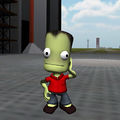Difference between revisions of "Kerbal"
From Kerbal Space Program Wiki
GregroxMun (talk | contribs) (→Material culture and technology) |
(→Biology: split theories into sub-bullets (this isn't getting indented for some reason), added one) |
||
| Line 15: | Line 15: | ||
*Kerbals are capable of spending years in space without showing any signs of muscle atrophy or other ill effects. | *Kerbals are capable of spending years in space without showing any signs of muscle atrophy or other ill effects. | ||
| − | *Kerbals can survive for years with minimal food and oxygen supply. One theory is that they are able to enter a state of hibernation to endure long space travels. Another theory is that their green skin may contain chlorophyll allowing them to photosynthesize their own food. | + | *Kerbals can survive for years with minimal or no food and oxygen supply. |
| + | **One theory is that they are able to enter a state of hibernation to endure long space travels. | ||
| + | **Another theory is that their green skin may contain chlorophyll allowing them to photosynthesize their own food. | ||
| + | **They may also not need oxygen to breathe, as they have no nose and can survive with their mouth closed. | ||
*Kerbals are prone to dying from shock when exposed to unexpected technological innovations. Anecdotal evidence for this can be found in the descriptions of the [[Rockomax Hubmax Multi-Point Connector]] and the [[RoveMax Model 3]]. | *Kerbals are prone to dying from shock when exposed to unexpected technological innovations. Anecdotal evidence for this can be found in the descriptions of the [[Rockomax Hubmax Multi-Point Connector]] and the [[RoveMax Model 3]]. | ||
Revision as of 16:32, 24 May 2013

Kerbal astronaut in EVA
Kerbals are the native denizens of the planet Kerbin. Kerbals appear to be bipedal. Mature kerbals stand roughly 0.75 meters in height.
Kerbals have a massive head with respect to their bodies, being nearly 50% of an adult kerbal's body mass.
Biology

Kerbal from Kerbalizer
- Although kerbals appear mostly hairless, they have notable hair growth occurring chiefly on the top of the head.
- Kerbal skin hues appear to range from light green to pale green.
- Kerbals are capable of spending years in space without showing any signs of muscle atrophy or other ill effects.
- Kerbals can survive for years with minimal or no food and oxygen supply.
- One theory is that they are able to enter a state of hibernation to endure long space travels.
- Another theory is that their green skin may contain chlorophyll allowing them to photosynthesize their own food.
- They may also not need oxygen to breathe, as they have no nose and can survive with their mouth closed.
- Kerbals are prone to dying from shock when exposed to unexpected technological innovations. Anecdotal evidence for this can be found in the descriptions of the Rockomax Hubmax Multi-Point Connector and the RoveMax Model 3.
- All kerbals seem to be male (at least the ones approved to go into space), judging by their names. They might also be genderless.
Language
- Kerbals can speak, as of some recent trailers. Currently they do not speak in-game.
- In trailers they speak reverse spanish
Material culture and technology
- Limited observation makes this difficult to determine. Kerbal technology and architecture appears to share many similarities with the modernized nations of Earth during the 1970-2000's, however no city landscapes currently exist (0.20).
- Due to the humorous descriptions of parts in-game, it can be assumed Kerbals are, to some extent, less intelligent than Human Beings.
- Kerbals usually find planets by accident, usually involving what was thought by it's discoverer to be a piece of dust or a smudge on the lens.
- Kerbals seem to be in infinite supply, perhaps everyone wants to be a kerbonaut, or the planet Kerbin itself spews out the little green men. In the loading splash screen, there is text that says "Motivating Kerbals" right before "Recruiting Kerbals"


